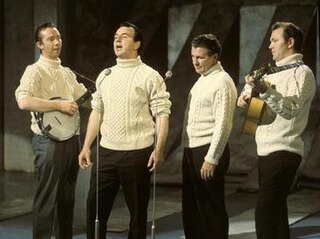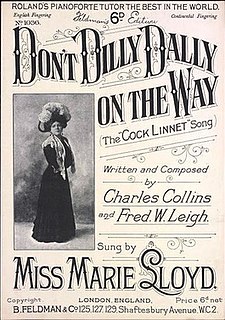Related Research Articles
"Clancy of the Overflow" is a poem by Banjo Paterson, first published in The Bulletin, an Australian news magazine, on 21 December 1889. The poem is typical of Paterson, offering a romantic view of rural life, and is one of his best-known works.

The Clancy Brothers were an influential Irish folk music group that developed initially as a part of the American folk music revival. Most popular during the 1960s, they were famed for their Aran jumper sweaters and are widely credited with popularising Irish traditional music in the United States and revitalising it in Ireland, contributing to an Irish folk boom with groups like the Dubliners and the Wolfe Tones.

"Don't Dilly Dally on the Way", subtitled "The Cock Linnet Song" and often credited as "My Old Man ", is a music hall song written in 1919 by Fred W. Leigh and Charles Collins, made popular by Marie Lloyd.

Liam Clancy was an Irish folk singer and actor from Carrick-on-Suir, County Tipperary. He was the youngest member of the influential folk group the Clancy Brothers, who are regarded as Ireland's first pop stars. They recorded 55 albums, achieved global sales of millions and appeared in sold-out concerts at such prominent venues as Carnegie Hall and the Royal Albert Hall.

"Where Do You Go To?" is a song by the British singer-songwriter Peter Sarstedt. Its recording was produced by Ray Singer, engineered by John Mackswith at Lansdowne Recording Studios and released in 1969. The music has been described as "a faux European waltz tune," and the arrangement is a very simple one of strummed acoustic guitar and bass guitar, with brief bursts of French-style accordion at the start and the end. The arranger and conductor was Ian Green.

Thomas Makem was an internationally celebrated Irish folk musician, artist, poet and storyteller. He was best known as a member of the Clancy Brothers and Tommy Makem. He played the long-necked 5-string banjo, tin whistle, low whistle, guitar, bodhrán and bagpipes, and sang in a distinctive baritone. He was sometimes known as "The Bard of Armagh" and "The Godfather of Irish Music".
"The Patriot Game" is an Irish ballad with lyrics by Dominic Behan and a melody from the traditional tune "The Merry Month of May".

Princess Augusta Sophia of the United Kingdom was the sixth child and second daughter of King George III and Queen Charlotte.
"The Parting Glass" is a Scottish traditional song, often sung at the end of a gathering of friends. It has also long been sung in Ireland, enjoying considerable popularity to this day and strongly influencing the style in which it is often now sung. It was purportedly the most popular parting song sung in Scotland before Robert Burns wrote "Auld Lang Syne".
"South Australia" is a sea shanty, also known under such titles as "Rolling King" and "Bound for South Australia". As an original worksong it was sung in a variety of trades, including being used by the wool and later the wheat traders who worked the clipper ships between Australian ports and London. In adapted form, it is now a very popular song among folk music performers that is recorded by many artists and is present in many of today's song books.
Makem and Clancy was an Irish folk duo popular in the 1970s and 1980s. The group consisted of Tommy Makem and Liam Clancy, who had originally achieved fame as a part of the trailblazing folk group The Clancy Brothers and Tommy Makem in the 1960s. Makem and Clancy sang a combination of traditional Irish music, folks songs from a variety of countries, and newly written pieces, including compositions that Tommy Makem himself wrote. One reporter described their music as "more polished and varied than that used by the Clancy Brothers."

The Rising of the Moon: Irish Songs of Rebellion is a collection of traditional Irish folk songs performed by The Clancy Brothers and Tommy Makem. It was the group's first album and was initially recorded in 1956. For the original recording, the only instrument used was Paddy Clancy's harmonica, since Tommy Makem had damaged his hand and Liam Clancy was still learning how to play the guitar. The group had yet to develop its distinctive musical sound, so there was little ensemble singing.

The Clancy Brothers' Greatest Hits is an original studio album of some of The Clancy Brothers' most popular hits re-recorded with Louis Killen. The Clancys had performed each of these songs previously with different arrangements with their former partner Tommy Makem in the 1960s. This was the group's first of three albums for Vanguard Records, their last album with Killen, and the final album they would release for almost a decade. The recording was initially released as a double album. A backing musician on a few of the tracks is Don McLean, best known for his song "American Pie".
Diane Hamilton was the pseudonym of Diane Guggenheim, an American mining heiress, folksong patron and founder of Tradition Records.

The Lark in the Morning is an album by Liam Clancy, Tommy Makem, family and friends.

The Girl from Utah is an Edwardian musical comedy in two acts with music by Paul Rubens, and Sidney Jones, a book by James T. Tanner, and lyrics by Adrian Ross, Percy Greenbank and Rubens. The story concerns an American girl who runs away to London to avoid becoming a wealthy Mormon's newest wife. The Mormon follows her to England, but she is rescued from a bigamous marriage by a handsome actor.

"The Butcher’s Boy" or "The Butcher Boy" is an American folk song derived from traditional English ballads. Folklorists of the early 20th century considered it to be a conglomeration of several English broadside ballads, tracing its stanzas to "Sheffield Park", "The Squire's Daughter", "A Brisk Young Soldier", "A Brisk Young Sailor" and "Sweet William " and "Died for Love".

The Steampunk Album That Cannot Be Named for Legal Reasons, originally known as Now That's What I Call Steampunk! Volume 1, is the first album by the English steampunk band The Men That Will Not Be Blamed for Nothing. The album was released by Leather Apron on CD and digital download and as a limited edition set containing one track on a phonographic wax cylinder. It is the first time a musical track has been released commercially as a wax cylinder in Britain since 1922. The album was renamed in January 2012, after EMI gave the band three days to change the title or face legal action.
"Jesse James" is a 19th-century American folk song about the outlaw of the same name, first recorded by Bentley Ball in 1919 and subsequently by many others, including Bascom Lamar Lunsford, Vernon Dalhart, Woody Guthrie, Pete Seeger, The Kingston Trio, The Pogues, The Ramblin' Riversiders, The Country Gentlemen, Willy DeVille, Van Morrison, Grandpa Jones, Bob Seger, The Nitty Gritty Dirt Band, Carl Sandburg, Sons of the Pioneers, Johnny Cash, Liam Clancy, Mungo Jerry and Bruce Springsteen. Members of the Western Writers of America chose it as one of the Top 100 Western songs of all time.